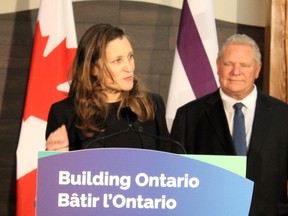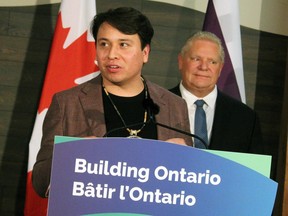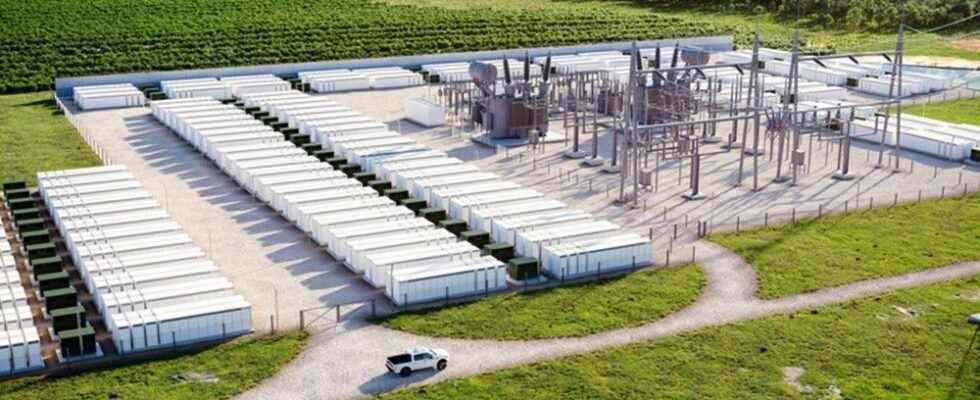
OHSWEKEN The federal and provincial governments are investing in the construction of what they say will be the largest battery storage project in Canada built on Six Nations of the Grand River.
The 250-megawatt Oneida Energy storage project will draw and store electricity from the provincial grid – more than 80 per cent of which is emissions-free – when power demand is low and return the power to the system when demand is high.
On Friday, Deputy Prime Minister Chrystia Freeland was in Ohsweken, along with Ontario Premier Doug Ford, to announce a $50-million federal investment in the project.
“When our two governments work together, in partnership with Indigenous communities, we can help to build a stronger economy and a more sustainable province,” said Freeland.
The premier described the project as a “game-changer” and said it would help provide affordable clean energy to the province’s growing population.
The project, which is expected to begin operations in 2025, will provide enough power to meet the peak demand of a small city, such as Oshawa, and reduce carbon emissions by 2.2- to 4.1-million tonnes, which is equivalent to taking up to about 40,000 cars off the road, the government said.
Aside from the federal funding, the project will be supported by the Canada Infrastructure Bank, which has pledged $170 million, and the Ontario government. The facility is being developed by Six Nations of the Grand River Development Corp., Northland Power Inc., NRStor Inc. and Aecon Group Inc.
Matt Jamieson, chief executive of the Six Nations development corporation, said the project is “all about the creation of jobs” for the community.
“We have a $1.6-billion infrastructure gap and need to take control of our destiny,” said Jamieson. “We’re going to put our people to work. This is going to have a great socio-economic impact for a community that really needs it.”
Annette Verschuren, chair and CEO of NRStor Inc., said work on the project began in 2018 and was interrupted by the pandemic, supply chain problems and other issues.
“It’s one of those projects you thought would never end. We’ve dreamed of this moment.”
Ford said the province has directed the Independent Electricity System Operator to enter into a 20-year deal with the project as part of its push for more clean energy supply.
“I’m thrilled to see so many great partners come together to build this world-class project that will provide affordable, clean energy for generations to come,” he said. “With a growing population and as we secure game-changing investments in our economy, our government is supporting innovative and bold energy solutions to meet the increasing demand for power, including battery storage and small modular reactors.”
Freeland said the project is an “essential part of the path to reconciliation” with Indigenous groups.
“I think we recognize that Canada is an amazing country, but we have an original sin and reconciliation is the path forward.”

Mark Hill, elected Chief of Six Nations of the Grand River, said the project is “all about creating jobs.”
When questioned about whether the Haudenosaunee Confederacy has been consulted about the project, Hill said there was “every opportunity for them to join in.”
“It’s time, once and for all, for all of us to get in one room,” he said. “We’re looking for way to further build relationships.”
